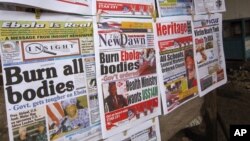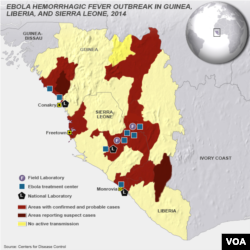The United States has issued travel warnings for Guinea, Sierra Leone and Liberia, the three countries hardest hit by the ongoing Ebola outbreak.
The U.S. Centers for Disease Control and Prevention (CDC) is urging U.S. residents to avoid non-essential travel to the West African countries because of the outbreak, which it calls "unprecedented."
In a Thursday statement, the CDC said there had been instances of violence against aid workers in the region, and that Liberia's public health infrastructure is being "severely strained."
The U.S. health authority also said that at least three Americans had been infected, including two health care workers at an Ebola clinic.
The overall death toll from the Ebola outbreak has climbed to 729, including more than 50 new fatalities reported since last Friday.
The latest update from the World Health Organization (WHO) came as officials in Sierra Leone and Liberia moved to enact intensive new measures to stop the Ebola virus from spreading.
Sierra Leone's President Ernest Bai Koroma said the government will quarantine areas where the disease is found, restrict public meetings, search houses to find infected people and screen passengers at the country's main airport.
In Liberia, President Ellen Johnson Sirleaf announced the closure of schools, the shutdown of markets along border areas, and said all public facilities would be disinfected and chlorinated on Friday.
Guinea has the largest number of Ebola-related deaths at 339, followed by Sierra Leone at 233 and Liberia at 156. Another man with U.S. and Liberian citizenship died in Nigeria last week soon after arriving on a flight that made stops in Ghana and Togo.
The WHO says Nigerian authorities have identified 59 people who may have come into contact with the man before he died.
In another development, the WHO said it is launching a $100 million response plan to deal with the Ebola outbreak, which it also called unprecedented.
In a Thursday statement, the agency said WHO chief Margaret Chan will meet with the presidents of Liberia, Sierra Leone and Guinea in Conakry on Friday to discuss the plan.
WHO said the new measure will focus on finding ways to stop the virus' transmission in the affected countries and preventing Ebola from spreading to neighboring nations.
Doctors Without Borders is among the medical groups that have been trying to fight the spread of Ebola in Sierra Leone. The group's Anja Wolz said it lacks the manpower to fully address the problem.
"We only have the possibility to work in the case management centers and we don't have the capacity to go outside. The situation is quite difficult. I would say, we are on the top of an iceberg in the moment because the contact tracing is not really functioning. This is one of the major issues what we have. Because, to find the patient as soon as possible and to refer them to the case management center, it's the basic for an Ebola outbreak."
Meanwhile, two U.S. Peace Corps volunteers in Liberia have been isolated after potential exposure to Ebola.
A spokeswoman confirmed Wednesday the two “had contact with an individual who later died of the Ebola virus."
The Peace Corps is temporarily removing all of its volunteers from Liberia, Sierra Leone and Guinea as a precautionary measure.
There is no vaccine or cure for Ebola, which can be fatal in up to 90 percent of cases. The disease is characterized by fever, vomiting, diarrhea, body aches, and unstoppable bleeding from areas such as the eyes, ears and nose.
The Ebola virus is transmitted through contact with the blood or bodily fluids of an infected person. Health officials are warning people to not touch Ebola patients and to avoid burial rituals that require handling the body of an Ebola fatality.






